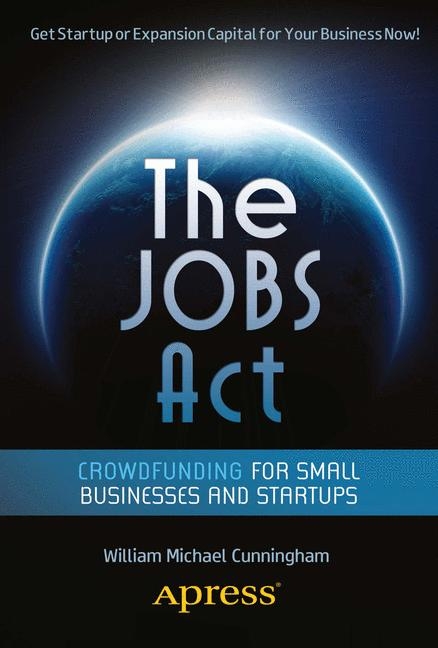
Jobs Act
Apress (Verlag)
978-1-4302-4755-5 (ISBN)
- Titel erscheint in neuer Auflage
- Artikel merken
Investment expert William Michael Cunningham shows how the new law will enable you to use the internet to raise significant amounts of capital funding for your startup. After discussing briefly the development and implementation of the law, what it means, and how it will impact the business startup marketplace, he delivers the nuts and bolts of how to take advantage of the JOBS Act to access new sources of capital for your small business or startup. As you'll see, the act has the power to unleash a new wave of innovation, increase employment, and set many more average entrepreneurs and investors on the road to wealth. Not just for entrepreneurs, The JOBS Act: Crowdfunding for Small Businesses and Startups will benefit investors, securities lawyers, community development specialists, educators, venture capitalists, and those offering services in the new crowdfunding arena. It is, simply, the most current and most comprehensive compendium of information on the law and its impact on this new market.
William Michael Cunningham is an economist, investment advisor, researcher, and social investing policy analyst. Cunningham researches, evaluates, develops, and creates specific socially responsible investments. On February 6, 2006, he warned the SEC that statistical models he created using his Fully Adjusted Return Methodology signaled the possibility of system-wide economic and market failure. A former securities broker and institutional salesman, he works with pension fund trustees, investment managers, community activists, government agencies, and financial industry organizations to create and implement social and community investing initiatives. Cunningham has testified before the Ways and Means and Financial Services Committees of the U.S. House of Representatives. In an October 1998 petition to the United States Court of Appeals, he opposed the elimination of the Glass Steagall Act, citing evidence that growing financial market malfeasance greatly reduced the safety and integrity of large financial institutions. Cunningham has been involved in the provision of online resources to small businesses for over fifteen years, posting his first website in 1995. In 2002, he created a proposal for an early version of Crowdfunding. Cunningham holds an MA in economics from the University of Chicago, as well as an MBA in finance from the university s Booth School of Business.
Introduction The JOBS Act represents a fundamental change in the business financing environment. Many companies previously blocked out of the market will now be able to obtain funding. This could and should lead to many more business success stories, as well as many more product and service "disruptions" across the board. The introduction will review the history of the Act, noting who wrote it and outlining the legislative players and timeline as well as their overall expectations. Part I: Summary of the JOBS Act Part I covers the basic thrust of the law and what it hopes to accomplish. Chapter 1: The Act: Summary and Definitions The law targets emerging growth companies and defines them as an issuer with "total annual gross revenues of less than $1 billion" during its most recently completed fiscal year." These firms are now exempt from certain reporting requirements.To understand the law, you must know the precise meaning of several terms, including "Emerging Growth Company" and "Crowdfunding." In addition, it's important to understand the set of institutional arrangements that govern the market for startup financing. Using examples, charts, and graphs, I will describe the marketplace. Chapter 2: The Startup Financing Environment: Why Now? Using information on startup business capital flows, I will describe how startups are currently financed. The impact of the financial crisis on the availability of capital for startup business financing will be described in detail. Part II: Disclosure One of the major changes promulgated by the JOBS Act is the change on financial disclosures. Startups are relieved from many of the more burdensome accounting and reporting requirements, especially requirements that are imposed by the Securities and Exchange Acts of 1933 and 1934. This section will describe these changes in detail, and provide sample before-and-after financial statements. Chapter 3: Emerging Growth Companies Emerging Growth Companies are defined as firms with less than $1 billion in revenue. This is a large and amorphous grouping. I will present charts and graphs showing the number and type of firms in this category. In addition, I will describe characteristics of companies in this group and how they might take advantage of the new law. Chapter 4: Accounting and Other Standards Accounting and other information standards and regulations have been significantly reduced for Emerging Growth Companies. This chapter will enumerate those changes. Chapter 5: Crowdfunding Crowdfunding can be described as social media-enabled business financing. Startups and others use crowd financing to raise capital for business ventures. Startups, special ventures, and small- and medium-sized businesses can all use crowdfunding. This chapter outlines the short history of crowdfunding and the huge impact the law will have. Chapter 6: Funding Portals A Funding Portal is, according to the law, "any person acting as an intermediary in a transaction involving the offer and sale of securities for the account of others, solely pursuant to section 4(6) of the Securities Act of 1933 (15 U.S.C. 77(d)(6))." In plain English, it is a website that facilitates the creation and sale of equity (or debt) securities issued by startups. If eBay, for example, were to allow people on their site to sell shares of stock in new ventures, it would be a Funding Portal. This chapter will detail how portals operate and what it takes to become one. Part III: The Act, by Title In the final third of the book, I offer verbatim language of the JOBS Act, along with my commentary on each section. This will be important, as sometimes citizens can "set the rules" and influence the practical ways the law can be applied before regulators start codifying it. Chapter 7: Title I - Reopening American Capital Markets to Emerging Growth Companies Commentary Chapter 8: Title II - Access to Capital for Job Creators Commentary Chapter 9: Title III - Crowdfunding Commentary Chapter 10: Title IV - Small Company Capital Formation Commentary Chapter 11: Title V - Private Company Flexibility and Growth Commentary Chapter 12: Title VI - Capital Expansion Commentary Chapter 13: Title VII - Outreach Commentary Appendix Crowdfunding sites
| Erscheint lt. Verlag | 2.10.2012 |
|---|---|
| Zusatzinfo | biography |
| Verlagsort | Berkley |
| Sprache | englisch |
| Maße | 178 x 254 mm |
| Gewicht | 313 g |
| Themenwelt | Wirtschaft ► Betriebswirtschaft / Management ► Finanzierung |
| Wirtschaft ► Betriebswirtschaft / Management ► Unternehmensführung / Management | |
| ISBN-10 | 1-4302-4755-X / 143024755X |
| ISBN-13 | 978-1-4302-4755-5 / 9781430247555 |
| Zustand | Neuware |
| Informationen gemäß Produktsicherheitsverordnung (GPSR) | |
| Haben Sie eine Frage zum Produkt? |
aus dem Bereich



